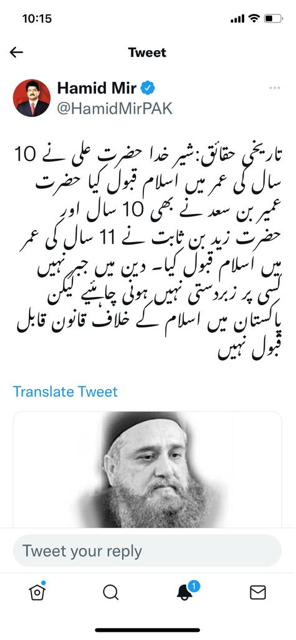Nasir Saeed gave the following report of his visit:
Since my main purpose of this visit was to get first-hand information and understanding on issues related to minorities, I have had several meetings with Christian activists, lawyers, victims and their families.
After having several meetings, I understand that forced conversion is a major concern for the religious minorities but unfortunately the government of Pakistan seems to lack the political will to resolve this matter. This can be because of political instability in the country and pressure from the religious hardliner groups but all this is creating a living hell for religious minorities.
Unfortunately, there is no quick fix to the minorities’ issues as the government has never given them attention whether it is in regard to discrimination in schools and the college syllabus, employment, marriage and divorce, the misuse of the blasphemy law against them or the issue of forced conversion of minor girls.
The issue of forced conversion of minor Christian and Hindu girls has become much more complicated after the rejection of the Anti-forced conversion bill by the parliamentary committee. It means that this matter cannot be brought to parliament for a long time because even though the government has changed, the parliamentarians are going to be almost the same and sadly Christian and Hindu minor girls will continue to suffer and be targeted and there will be no justice for them.
The Council of Islamic Ideology (CII) and the Ministry of Religious Affairs have already expressed their views and the last hope to get justice was the courts which are already giving shariah influenced judgments. In the recent case of a Christian girl, Chashman 14, the Lahore high court judge, Tariq Nadeem, said that there is no minimum age of conversion in Islam and that neither the Holy Quran nor the any Hadith of the Prophet (PBUH) stipulates a minimum age for converting to Islam. He further said that Hazrat Ali was 10 when he embraced Islam.
He further said that Muslim jurists regard the mental capacity of a child as of crucial importance when considering the question of their conversion.
The judge remarks that the age of discernment is generally reckoned as the age when one attains puberty.
 Such remarks and judgments encourage the perpetrators and underpin the victimisation of minor girls and this is not the first judgment of its kind by the high court’s judges. There are several others whether it was the case of Maira Shahbaz, Huma Younis, Nayab Gill or 14 year old Shakina who is still in the custody of her kidnappers.
Such remarks and judgments encourage the perpetrators and underpin the victimisation of minor girls and this is not the first judgment of its kind by the high court’s judges. There are several others whether it was the case of Maira Shahbaz, Huma Younis, Nayab Gill or 14 year old Shakina who is still in the custody of her kidnappers.
It is a dangerous trend especially when judges of the high court give such Shariah influenced judgments instead of upholding the prevailing law of the country, like the Child Marriage Restraint Act (1929) which criminalises marriages of girls under 16 and boys under 18. Pakistani courts also continue to ignore the international standards.
It is not just police and judges, but other factions of Pakistani society have the same belief and mindset and the majority of Muslims are against the setting of a minimum age for conversion to Islam as they believe that anti-forced conversion legislation will be against the Quran and Sunnah and can create unrest in the public.
Recently, a renowned journalist, Hamid Mir expressed the same view in his tweet that any legislation against Islam in Pakistan is unacceptable.
Keeping in view such a desperate situation, where there is no hope for justice and change, we need to continue to work hard independently and in collaboration and use all platforms available nationally and internationally.
We are working on our short-term strategy, such as trying to get relief from the courts and long-term strategy for the legislation, but it is not possible without your support. It is very important to keep reminding Pakistan of its international human rights obligations especially towards children, women and minorities.